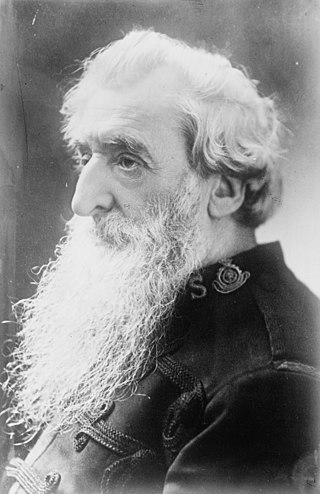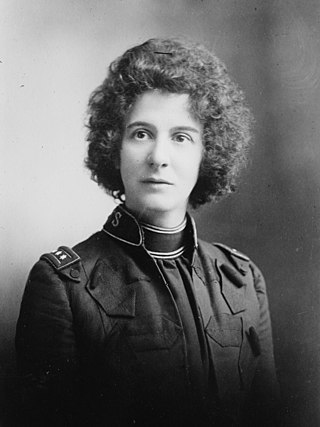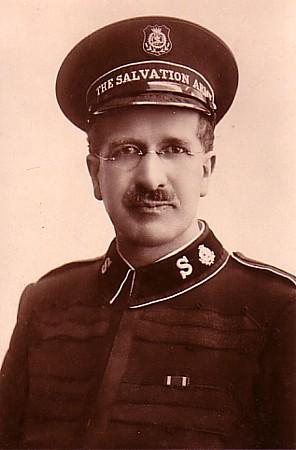
William Booth was an English Methodist preacher who, along with his wife, Catherine, founded the Salvation Army and became its first General (1878–1912). The Christian movement with a quasi-military structure and government founded in 1865 has spread from London to many parts of the world and is known for being one of the largest distributors of humanitarian aid.

General is the title of the international leader and Chief Executive Officer (CEO) of the Salvation Army, a Christian denomination with extensive charitable social services that gives quasi-military rank to its ministers. The General is elected by the High Council of The Salvation Army and serves a term of five years, which may be extended to seven years. According to the organisation, the General is purported to be appointed by God, and the council identifies that person. Brian Peddle, the current general, assumed the position in August 2018 upon the retirement of André Cox. The organisation's founder, William Booth, was the first and longest-serving general. There have been 22 generals as of 2023.

The High Council of The Salvation Army elects a new General in the event of a vacancy or prior to the retirement of the existing office holder. It can also remove a General who can no longer fulfil their duties. It is made up of the Chief of the Staff, active commissioners who are territorial commanders or who hold an international or national headquarters or territorial leadership appointment, territorial commanders with the rank of colonel, and territorial leaders with the rank of colonel. It is not a governing body of the Salvation Army, and is regarded as having no continuity of existence between meetings.

The Chief of the Staff of The Salvation Army is a Commissioner appointed by the General of The Salvation Army as the second in command internationally. The Chief of the Staff is stationed at International Headquarters in London.

William Bramwell Booth, CH was a Salvation Army officer, Christian and British charity worker who was the first Chief of Staff (1881–1912) and the second General of The Salvation Army (1912–1929), succeeding his father, William Booth.

Evangeline Cory Booth, OF was a British evangelist and the 4th General of The Salvation Army from 1934 to 1939. She was the first woman to hold the post.

Edward John Higgins was the third General of The Salvation Army (1929–1934).

In 1917, five years after the death of the founder of the Salvation Army William Booth, his son, General Bramwell Booth, inaugurated the Order of the Founder to recognise Salvationists who had rendered distinguished service, such as would have specially commended itself to the Founder.

Florence Eleanor Booth was the wife of Bramwell Booth, Second General of The Salvation Army.

Commissioner Catherine Bramwell-Booth, born Catherine Booth Booth, Salvation Army officer, was one of seven children born to General Bramwell Booth and Florence Eleanor Soper, and was the granddaughter of the Salvation Army's Founder, General William Booth and his wife Catherine Mumford, known as the 'Mother of the Salvation Army'. In her later years Bramwell-Booth became well-known through her books and various radio and television appearances. Bramwell-Booth lived to be 104.

George Scott Railton was a Scottish-born Christian missioner who was the first Commissioner of The Salvation Army.

Commissioner Thomas Henry Howard OF was the Second Chief of the Staff of The Salvation Army, succeeding Bramwell Booth on his appointment as General on the death of his father William Booth in 1912.

Commissioner Frederick St. George de Lautour Booth-Tucker, was a senior Salvation Army officer of the late nineteenth and early twentieth centuries, and the son-in-law of Willam and Catherine Booth, the Army's founders.

Commissioner Theodore Hopkins Kitching CBE was a prominent officer in The Salvation Army, acting as Secretary and confidant to Generals William Booth and Bramwell Booth, and was The Salvation Army's International Secretary for Europe from 1914 to 1916.

The rank of Commissioner in The Salvation Army is the second highest rank attainable by Officers in the organisation, and many of the Army's Territorial Commanders and even the Chief of the Staff hold this rank. The rank of Commissioner has been an active rank since 1880, and is one of the original ranks created by General William Booth, the first appointed Commissioner being George Scott Railton.

Commissioner John Lawley was a Commissioner in The Salvation Army, the second highest rank attainable by Officers in the organisation, and the highest 'appointed' rank. An early Salvationist, he joined The Salvation Army in 1877 when it was still called The Christian Mission. He was aide-de-camp to General William Booth from 1890 to 1912 as well as to General Bramwell Booth from 1912 to 1921.

The Salvation Army Act of 1980 is the legislation that governs the International Headquarters of The Salvation Army. The act limits and regulates the authority of the general of The Salvation Army, who serves as the organisation's chief executive officer (CEO). The legislation gained royal assent from Elizabeth II on 1 August 1980 and took immediate effect.

The Salvation Army Act of 1931 was an act of the parliament of the United Kingdom that was passed in 1931. Until it was amended in 1963 and again in 1980, the legislation governed the International Headquarters of The Salvation Army. The act limited and regulated the authority of the general of The Salvation Army, who serves as the organisation's chief executive officer (CEO), and removed his ability to act as the sole owner of Salvation Army trusts. The legislation gained royal assent from George V on 31 July 1931 and took immediate effect.

John McMillan was a Scottish minister and Salvation Army officer who served as the 5th Chief of the Staff of The Salvation Army from 1937 until his death in 1939.

Charles Baugh was an English minister and Salvation Army officer who served as the 7th Chief of the Staff of The Salvation Army from 1943 until 1946.















